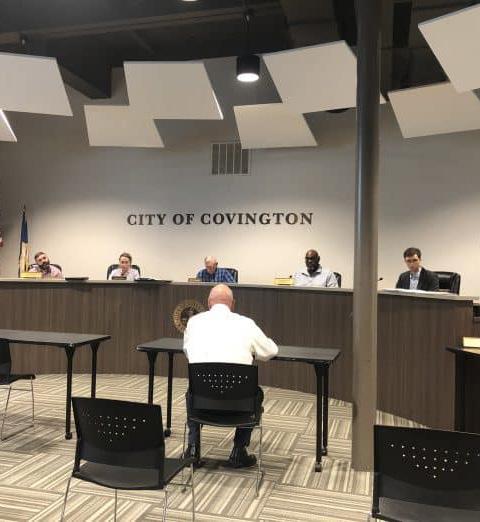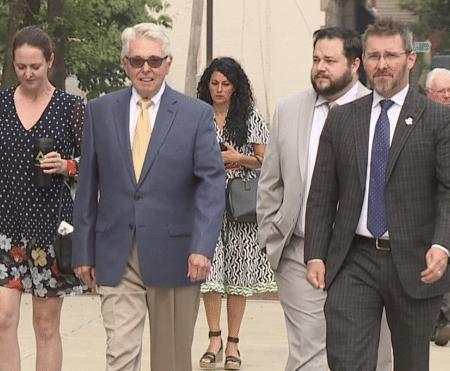
4 minute read
Covington approves new short-term rental regulations
BY NATHAN GRANGER | LINK nky KENTON COUNTY REPORTER
The Covington Board of Commissioners approved a new ordinance regulating the operation of shortterm rentals at a special meeting June 28.
The vote follows a long period of regulatory deliberation and public comment that began at the end of last year when the board declared an emergency moratorium on new licenses for short-term rentals, often referred to as Airbnbs after the web service where such rentals are advertised, in the city.
Although the vote officially ends the moratorium, it does not finalize regulations of short-term rentals; The city will now need to revise its zoning plan to accommodate the new ordinance, a process that will require approval from the county and could take months, a city press release stated.
“I really appreciate and I applaud the number of our constituents that have reached out to us and engaged with us to try and help guide this process,” said Commissioner Tim Downing.
The board completed a first reading of the ordinance the night before. The ordinance itself was a revision of a draft ordinance first crafted after an initial round of public comments, which included a public hearing in April.
“We had 47 people comment at the public hearings, and the city received 256 written comments” during the public input period, said Mayor Joe Meyer.
Covington began regulating short-term rentals in 2021 when city staff noticed their increased popularity, especially in neighborhoods closer to the riverfront. Visitors often come to Covington to use it as a place to stay for big events across the river in Cincinnati, like football games and conventions.
The city commission increased penalties for unregulated properties in March while the moratorium was still in effect, frus- trating many local investors and property owners, who felt the new regulations unduly stifled their business interests. Shortterm rental investors made their issues known in numerous statements to the commission at both public hearings and regular commission meetings.
Covington isn’t alone in regulating shortterm rentals. Several other cities in the region have deployed varying degrees of regulation on similar properties, and Lexington recently instituted its own regulations.
Although short-term rentals can be an economic boon for property owners and even municipalities as a whole, there are questions about how they affect city zoning practices, housing cost and access, and neighborhood safety.
At the public hearing earlier in June, some property owners expressed displeasure at several of the new regulations in the draft, particularly caps on the number of shortterm licenses that the city could issue in historic neighborhoods and the citywide total cap of 150 non-host-occupied units.
Despite these grievances, very little changed between the public hearing and Wednesday’s vote. All major proposals from the first draft were kept in the final version of the ordinance.
Wednesday’s vote codified the following measures, among others:
• Each rental unit must have its own corresponding rental license.

• The number of non-host-occupied units, where the property owner doesn’t live on-site in Covington, would be capped at 150. There would be no cap on host-occupied units.
• Historic neighborhoods would have caps on the number of non-host-occupied short-term rental properties.
• No person, business or organization may have more than four short-term rental licenses.
• Short-term rental licenses would be non-transferable and renewable ev- ery year from the date they’re issued.

• The licensing application fees would increase from $30 to $500 per unit for license applications received after Nov. 1. Applications received before Nov. 1 would be charged the original $30 fee. Annual renewal fees would be $250.
• Established license holders would be grandfathered into the new regulations and would be eligible for renewals.
• Anyone who applied for a license but didn’t obtain it due to the moratorium would have to reapply.
• No structure could have more than two short-term rental licenses.
• Special events, such as weddings and banquets, would not be permitted at short-term rental properties.
• Enforcement of short-term rental regulations would fall the city’s code enforcement board, which would use a three-strike rule when enforcing violations.
• A rental license appeals board would be established to hear appeals related to short-term licenses and code violations.
• Each property would have to have a dedicated local agent, who could quickly respond to any issues that arise during a renter’s stay.
Former Kenton coroner gets one-year sentence in opioid-dispensing case
Suetholz guilty on 12 counts involving three patients.
Two of those patients — with long addiction histories and failed drug tests — died from drug overdoses, according to federal prosecutors.
Suetholz, 74, defended his treatment decisions and said he will appeal the verdict and sentence.
“I care about my patients and everyone in the community that was here knows that,” Suetholz said. “I did not make any mistakes.”
Minnesota tool manufacturer expanding into NKY at Buttermilk Crossing
Tool manufacturer and retailer Northern Tool + Equipment is opening its first Northern Kentucky location in Crescent Springs’ Buttermilk Crossing shopping center.
“The countdown is on – we’re a week away from opening our newest store in Crescent Springs, Kentucky! Mark your calendars for July 8th,” the company posted to its official Facebook page.
name to Northern Tool + Equipment as it expanded. It’s headquartered in Burnsville, Minnesota — the city it was founded in. Its Crescent Springs store will be the company’s first in Kentucky.
Kentucky League of Cities awards safety grant to Fort Mitchell
Former Kenton County Coroner David Suetholz was sentenced on June 28 to one year and a day in federal prison for illegally dispensing opioids and other drugs through his private practice.

Last year, a federal jury in Covington found
Suetholz “ignored” patients’ failed drug tests, didn’t do adequate screening for addiction history, and still prescribed medicine that put vulnerable patients at greater risk, according to a sentencing memorandum written by Maryam Adeloya, a prosecutor with the Fraud Section of the United States Department of Justice Criminal Division in Washington.
Northern is opening in a nearly 24,800-square-foot space that Staples previously occupied.
The store carries popular tool brands like Milwaukee, Bosch, DeWalt and Husqvarna. Additionally, Northern manufactures and sells its own in-house tool brand, North Star.
Founded as Northern Hydraulics in 1981 by Don Kutola, the company changed its










